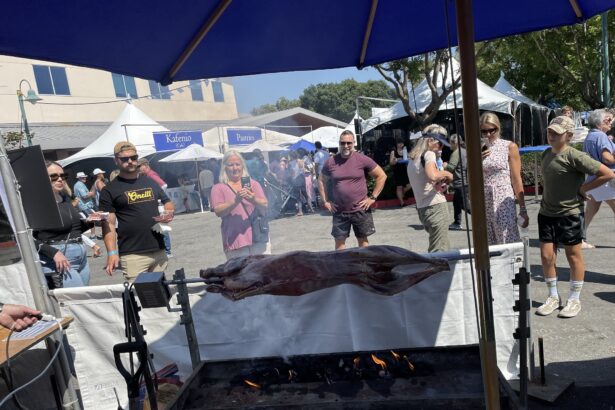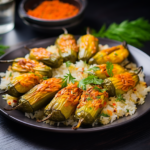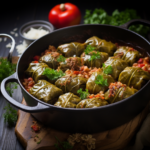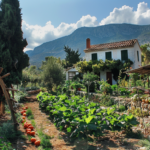If you have a passion for food and a love for cultural experiences, then exploring Greek food festivals and traditions is a must for you. Delve into the vibrant world of Greek cuisine, rich with flavors and aromas that will transport you to the sunny shores of Greece. From the sizzling souvlaki to the creamy tzatziki, Greek food is a delightful feast for the senses. Be enchanted by the lively atmosphere of Greek food festivals, where locals and visitors come together to celebrate the tantalizing tastes of Greece. Embark on a culinary adventure and discover the secrets behind traditional Greek recipes, handed down through generations. So grab a plate and get ready to indulge in the mouthwatering delights of Greek food and traditions.

Greek Food Festivals
Overview of Greek Food Festivals
Greek food festivals are a vibrant and cherished part of Greek culture. They are held throughout the year in towns and villages across the country, and they offer a wonderful opportunity to immerse yourself in the rich culinary traditions of Greece. These festivals showcase not only the delicious flavors of Greek cuisine but also the warmth and hospitality of the Greek people.
Popular Greek Food Festivals
One of the most popular Greek food festivals is the Athens Food Festival, held annually in the heart of the capital city. This festival brings together renowned chefs, local producers, and food enthusiasts to celebrate Greek gastronomy. Another well-known festival is the Thessaloniki Food Festival, which takes place in Greece’s second-largest city. This event showcases the diverse flavors of northern Greece and attracts visitors from all over the world.
The Role of Food in Greek Food Festivals
Food plays a significant role in Greek festivals, as it is seen as a way to bring people together and foster a sense of community. Whether it’s a religious festival or a local celebration, food is always at the center of the festivities. Sharing a meal with family, friends, and even strangers is a cherished tradition in Greece, and it is no different during festivals. The act of breaking bread together symbolizes unity and hospitality, values that are deeply ingrained in Greek culture.
Traditional Greek Dishes Served at Greek Food Festivals
Greek festivals offer a wide array of traditional dishes that showcase the flavors and ingredients of Greek cuisine. Some popular dishes include moussaka, a hearty casserole made with layers of eggplant, lamb, and béchamel sauce; souvlaki, tender skewered meat typically served with pita bread; spanakopita, a savory pastry filled with spinach and feta cheese; and loukoumades, fluffy deep-fried dough balls drizzled with honey and sprinkled with cinnamon. These dishes, among many others, are prepared with love and care, and they truly capture the essence of Greek culinary traditions.
Religious Food Traditions of Greek Food Festivals
Importance of Religion in Greek Culture
Religion holds great significance in Greek culture, and it has a profound influence on the country’s food traditions. The Greek Orthodox Church plays a central role in the lives of many Greeks, and religious festivals are deeply intertwined with culinary customs. Food is not only a means of sustenance but also a way to express devotion and connect with one’s spirituality.
Religious Food Fasting and Feasting
Religious fasting is a common practice in the Greek Orthodox Church, and it involves abstaining from certain foods for a period of time. Fasting periods, such as Lent, are marked by a plant-based diet that excludes meat, dairy, and even olive oil. On the other hand, feasting is an integral part of religious celebrations. After a period of fasting, there is a sense of joy and celebration that is expressed through indulging in rich and flavorful dishes.
Lenten Food Traditions
Lent is a significant period of religious fasting in Greece, leading up to Easter. During this time, Greeks follow a strict diet that limits certain ingredients. Traditional Lenten dishes include fasolada, a hearty bean soup; taramasalata, a creamy dip made from fish roe; and gemista, stuffed vegetables with a flavorful rice and herb filling. These dishes showcase the creativity and resourcefulness of Greek cuisine, as they are prepared without the use of animal products.
Easter Food Traditions
Easter is the most important religious festival in Greece, and it is celebrated with great fervor and culinary traditions. The centerpiece of the Easter feast is a whole roasted lamb, known as “kokoretsi.” This succulent dish is prepared by wrapping seasoned lamb offal in a mixture of herbs, spices, and intestines, then roasting it over an open fire. Other traditional Easter specialties include “tsoureki,” a sweet braided bread, and “magiritsa,” a hearty soup made from lamb offal and herbs.
Traditional Greek Food Festivals
History and Origins of Greek Cuisine
Greek cuisine has a rich history that dates back thousands of years. Influenced by Ancient Greek, Byzantine, and Ottoman culinary traditions, it combines elements from various civilizations that have inhabited the region. Ancient Greek philosophers, such as Socrates and Plato, even wrote about the importance of food and its impact on health and well-being.
Key Ingredients in Greek Cooking
Greek cuisine is known for its simplicity and the use of fresh, quality ingredients. Olive oil is a staple in Greek cooking and is used generously in many dishes. Other key ingredients include vegetables like tomatoes, eggplants, and zucchini, as well as grains like wheat and barley. Fresh herbs such as oregano, thyme, and mint add depth and flavor to Greek dishes. Additionally, Greek cuisine is characterized by the use of seafood, lamb, and dairy products like feta cheese and yogurt.
Mediterranean Diet and Greek Cuisine
Greek cuisine is often associated with the Mediterranean diet, which is renowned for its health benefits. The Mediterranean diet emphasizes the consumption of whole grains, fresh fruits and vegetables, legumes, nuts, and healthy fats like olive oil. This diet has been linked to a reduced risk of heart disease, diabetes, and certain cancers. The use of fresh, seasonal ingredients and the avoidance of processed foods are key principles of Greek cuisine that contribute to the overall healthfulness of the Mediterranean diet.
Regional Variations in Greek Food Festivals Cuisine
Greece’s diverse geography has given rise to a rich tapestry of regional variations in Greek cuisine. Each region has its own unique flavors, ingredients, and cooking techniques. For example, the islands of the Aegean Sea are known for their fresh seafood and simple, flavorful dishes. In Crete, the cuisine is heavily influenced by the island’s abundant olive groves and includes dishes like dakos, a bread salad with tomatoes and cheese. The mountainous regions of northern Greece offer hearty, meat-based dishes like moussaka and stifado, a slow-cooked beef stew.

Meze Culture
Introduction to Meze
Meze is an essential aspect of Greek culinary culture. It refers to a collection of small, flavorful dishes that are typically served alongside drinks in a social setting. Meze is meant to be shared and enjoyed with friends and family, encouraging a relaxed and convivial atmosphere. It is a perfect example of Greek hospitality and the importance of communal dining in Greek culture.
Common Greek Food Festivals Meze Dishes
A variety of meze dishes can be found in Greek cuisine. Some common examples include tzatziki, a creamy yogurt and cucumber dip; dolmades, grape leaves stuffed with rice and herbs; taramasalata, a smooth fish roe dip; and keftedes, savory meatballs flavored with herbs and spices. These dishes are often accompanied by fresh bread, olives, and a variety of cheeses. Meze provides an opportunity to sample a wide range of flavors and textures, making it a true culinary adventure.
Greek Food Festivals Meze Etiquette and Traditions
When enjoying meze, there are some traditions and etiquette to follow. It is customary to take small bites and savor the flavors of each dish. Meze is not meant to be rushed, but rather to be slowly enjoyed in the company of others. It is also polite to offer meze to others at the table and take turns ordering different dishes. Sharing food is an important aspect of Greek culture, and meze is a perfect expression of this hospitality.
Greek Food Festivals Meze in Greek Social Gatherings
Meze is an integral part of Greek social gatherings, whether it’s a small gathering of friends or a larger celebration. It provides an opportunity to relax, unwind, and engage in conversation while enjoying a variety of delicious dishes. Meze is often enjoyed alongside drinks such as ouzo or tsipouro, traditional Greek spirits. It is a time to connect with others, share laughter, and create lasting memories.
Street Food in Greece
Popular Greek Street Foods
Greek street food is a vibrant and flavorful part of the country’s culinary scene. From bustling city streets to coastal towns, you can find a variety of delicious street foods that showcase the diverse flavors of Greece. One popular street food is souvlaki, which features tender grilled meat, usually pork or chicken, wrapped in warm pita bread and topped with tzatziki, onions, and tomatoes. Another beloved street food is spanakopita, a savory pastry filled with spinach and feta cheese.
Street Food Culture in Greece
Street food culture in Greece is deeply rooted in tradition and is a reflection of the country’s diverse culinary heritage. Street food vendors take great pride in their craft, often using family recipes and time-honored cooking techniques. The focus is on using fresh, local ingredients to create dishes that are bursting with flavor. Whether it’s a gyro stand in Athens or a souvlaki cart in Thessaloniki, you can be sure to find a delicious and satisfying meal on the streets of Greece.
Street Food Festivals in Greece
Greece is not just home to ancient ruins and picturesque beaches; it also hosts a variety of street food festivals that celebrate the vibrant street food culture. These festivals bring together street food vendors from all over the country, providing visitors with the opportunity to sample a wide range of dishes. From traditional souvlaki and gyros to more modern interpretations of Greek street food, these festivals showcase the creativity and innovation of Greece’s culinary scene.
Traditional Pita and Souvlaki
Pita and souvlaki are two iconic Greek street foods that have gained international popularity. Pita is a type of flatbread that is used as the base for many Greek dishes. It can be filled with a variety of ingredients, such as grilled meat, fresh vegetables, and tangy sauces. Souvlaki, on the other hand, refers to skewered and grilled meat, typically served on a pita bread with a variety of toppings. These dishes are flavorful, filling, and a perfect representation of Greek street food culture.
The Symbolism of Greek Food Festivals
Food as a Cultural Symbol
Food holds great symbolism in Greek culture and is often used to convey deeper meanings and traditions. It is a way to connect with one’s heritage, express gratitude, and honor the gods. Through specific ingredients, preparation methods, and rituals, Greek cuisine becomes a symbol of identity, history, and spirituality.
Symbolic Foods in Greek Food Festivals Traditions
Greek traditions are filled with symbolic foods that hold special significance in religious and cultural celebrations. For example, the cutting and sharing of a round loaf of bread, known as “prosphora,” symbolizes unity and the body of Christ during religious services. In addition, the coloring and cracking of red-dyed eggs during Easter represent the blood of Christ and the joy and renewal of the resurrection.
Meaning Behind Symbolic Greek Food Festivals
Symbolic foods in Greek culture often carry deep meanings and associations. For example, the olive tree and olive oil are symbols of peace, abundance, and fertility. The use of herbs and spices, such as oregano and mint, is said to bring good luck and ward off evil spirits. These symbolic foods not only add flavor and aroma to Greek dishes but also serve as a connection to the past and a reflection of Greek values and beliefs.
Food in Greek Mythology
Greek mythology is filled with stories of gods and goddesses who shaped the world and influenced human civilization. Food often plays a central role in these myths, symbolizing abundance, fertility, and the divine. For example, the goddess Demeter is associated with grain and agriculture, while Dionysus, the god of wine, represents the pleasures of the vine. These myths and their associated foods are deeply ingrained in Greek culture and continue to shape culinary traditions to this day.
Greek Wine and Spirits at Greek Food Festivals
Ancient Greek Wine Making
Wine has been an integral part of Greek culture for thousands of years, with a rich history dating back to ancient times. The ancient Greeks were pioneers in wine production and developed sophisticated techniques for cultivating grapes and producing wine. They believed that wine was a gift from the gods and used it in various religious rituals and celebrations.
Traditional Greek Wine Varieties
Greece is home to a wide variety of indigenous grape varieties that are used to produce unique and flavorful wines. Some popular Greek wine varieties include Assyrtiko, a white grape from the island of Santorini known for its crisp acidity; Agiorgitiko, a red grape from Nemea known for its deep color and velvety texture; and Xinomavro, a red grape from Northern Greece known for its complex flavors and age-worthiness. These wines showcase the diversity and high quality of Greek winemaking.
Rituals and Traditions around Greek Wine at Greek Food Festivals
Greek wine is not just about the beverage itself; it is also about the rituals and traditions that accompany its consumption. Wine is often poured as a libation to honor the gods or to celebrate special occasions. The Greek tradition of “cheers,” known as “yamas,” involves making eye contact with each person at the table and clinking glasses together. This ritual is meant to foster a sense of camaraderie and toasting to good health and happiness.
Greek Spirits: Ouzo and Raki
In addition to wine, Greece is famous for its spirits, particularly ouzo and raki. Ouzo is a clear, anise-flavored spirit that is often enjoyed as an aperitif or alongside meze. It is typically served with ice and water, which causes the liquid to turn cloudy, a phenomenon known as the “ouzo effect.” Raki, on the other hand, is a strong grape-based spirit that is popular in Crete and other parts of Greece. It is often enjoyed as a digestif and is known for its distinct aroma and smoothness.
Regional Greek Specialties at Greek Food Festivals
Popular Regional Greek Dishes
Greece is a country with diverse regional cuisines, each offering its own unique specialties. In the Cyclades islands, for example, you can find dishes like Santorini’s famous fava bean puree and Mykonos’ traditional “kopanisti” cheese dip. In the northern region of Macedonia, you can savor dishes like “giouvetsi,” a hearty clay-baked meat and pasta dish, and “bougatsa,” a sweet and creamy pastry. These regional specialties reflect the local ingredients, cooking techniques, and cultural influences of each area.
Cretan Cuisine and Traditional Delights
Cretan cuisine is renowned for its simplicity, quality ingredients, and health benefits. The island of Crete is known for its abundant olive trees, which produce some of the finest olive oil in the world. Cretan dishes often feature fresh vegetables, herbs, and legumes, as well as locally sourced meat and seafood. Traditional Cretan delights include “dakos,” a bread salad with tomatoes and cheese; “stifado,” a slow-cooked beef stew with onions; and “kalitsounia,” sweet or savory pastries filled with cheese or herbs.
Discover the Delicious Greek Kalitsounia: The Crete Specialty
Macedonian and Thessalian Gastronomy at Greek Food Festivals
The northern regions of Macedonia and Thessaly boast their own unique and delicious gastronomic traditions. Macedonian cuisine is known for its flavorsome and hearty dishes, such as “kebap,” a spiced meat dish, and “tavče gravče,” baked beans with a smoky flavor. Thessalian cuisine, on the other hand, is characterized by the use of dairy products, like “katiki Domokou” cheese, and the abundance of fresh fruits and vegetables. These regional specialties offer a taste of the diverse culinary landscape of Greece.
Peloponnesian Culinary Traditions
The Peloponnese peninsula is home to a rich culinary heritage that showcases the bounty of the land and sea. Seafood dishes abound in coastal towns, while mountainous regions offer hearty meat-based dishes. The region is known for its pasta-like noodles, trahana, and its famous olive groves that produce high-quality olive oil. Traditional Peloponnesian specialties include “kokkinisto,” a slow-cooked meat stew, “melopita,” a sweet honey pie, and “stifado,” a rabbit or beef stew cooked with onions and spices. These dishes highlight the flavors and traditions of this diverse region.
Greek Desserts and Pastries
Greek Food Festivals and Classic Greek Desserts
Greek desserts are a heavenly combination of sweet flavors and delicate textures. From syrup-soaked pastries to creamy custards, Greek desserts offer a delightful end to any meal. Some classic Greek desserts include baklava, layers of phyllo dough filled with chopped nuts and drenched in honey syrup; loukoumades, fluffy deep-fried dough balls drizzled with honey and sprinkled with cinnamon; and galaktoboureko, a creamy semolina custard baked in crispy phyllo dough.
Phyllo Dough and its Use in Greek Pastries
Phyllo dough is a staple in Greek pastry-making and is known for its delicate, flaky texture. It is made by layering paper-thin sheets of dough with melted butter or olive oil. Phyllo is commonly used in a wide variety of Greek pastries and desserts, such as spanakopita, a savory spinach and feta pie; tiropita, a cheese-filled pastry; and baklava, a sweet nut-filled dessert. Working with phyllo dough requires patience and skill, but the results are well worth the effort.
Sweet Flavors and Ingredients in Greek Desserts
Greek desserts are known for their intense sweetness and use of rich flavors. Honey is a common sweetener in many Greek desserts and is often drizzled over pastries, yogurt, and fresh fruit. Another popular ingredient is rosewater, which adds a floral aroma and delicate flavor to desserts like loukoumades and rice pudding. Other common ingredients in Greek desserts include nuts, such as almonds and walnuts, as well as spices like cinnamon and cloves.
Traditions and Festivals Celebrating Greek Sweets
Greek desserts play a central role in many traditions and festivals throughout the year. One notable celebration is Apokries, the Greek version of Carnival, where people indulge in sweet treats like traditional Carnival donuts called “loukoumades.” Another festive occasion is St. Basil’s Day on January 1st, where a sweet bread called “Vasilopita” is baked with a hidden coin or trinket inside. The person who finds the hidden object is said to have good luck for the coming year. These traditions and festivals reflect the importance of desserts in Greek culture and the joy they bring to special occasions.
Cooking Workshops and Culinary Vacations
Participating in Greek Cooking Workshops
If you are passionate about Greek cuisine and want to dive deeper into its rich traditions, participating in a Greek cooking workshop is a fantastic way to do so. These workshops are often led by expert chefs or local home cooks who are eager to share their knowledge and skills. Participants have the opportunity to learn traditional recipes, as well as the techniques and secrets behind Greek cooking. It is an immersive experience that allows you to connect with the flavors, aromas, and cultural significance of Greek cuisine.
Learn Traditional Greek Food Festivals Recipes
Greek cooking workshops offer the chance to learn a variety of traditional Greek recipes, from classic dishes to regional specialties. Participants can learn how to make iconic dishes like moussaka, souvlaki, and baklava, as well as lesser-known recipes that showcase the rich diversity of Greek cuisine. Through hands-on cooking sessions and guidance from local experts, you can gain a deeper understanding of the techniques and ingredients that make Greek food so unique and delicious.
Experiencing Local Food Traditions
In addition to learning recipes, Greek cooking workshops often include visits to local markets, farms, and food producers. These experiences provide a deeper appreciation for the ingredients used in Greek cuisine and the importance of sourcing local and seasonal products. Participants can immerse themselves in the local food culture, interact with local producers, and witness firsthand the passion and dedication that goes into creating high-quality Greek ingredients.
Gastronomic Tours and Culinary Vacations in Greece
For those looking for a more immersive experience, culinary vacations and gastronomic tours in Greece offer an unforgettable journey through the country’s culinary landscape. These tours often combine cooking workshops, visits to local markets and food festivals, and the opportunity to dine at renowned restaurants. Participants can explore different regions of Greece, taste a variety of dishes, and learn about the cultural and historical significance of Greek cuisine. It is a chance to indulge in the flavors, traditions, and warm hospitality of Greece.
Voyage Through Greek Flavors with Chef on a Bike
Delving into the Richness of Greek Gastronomy, Presented by Digital Heroes Caffe and Financial Navigator 360
Embark on a rich culinary voyage with YouTube’s Chef on a Bike: Your Gateway to Greek Culinary Ventures. Sponsored by the innovative Digital Marketing Company, Digital Heroes Caffe and the adept Financial Navigator 360, we introduce you to our curated Greek Mezes Recipe. Chef on a Bike extends beyond a mere platform; it cultivates a vivacious community where the zest for Greek culinary traditions flourishes.
As you navigate through our culinary realm, you’re embraced by a milieu radiating with love for hearty Greek meals, the invigorating aroma of fresh herbs, and the camaraderie inherent in sharing a meal. Our mission, simple yet profound, aims to bridge the divide between the novice and the seasoned cook, melding time-honored and contemporary traditions, and uniting Greek cuisine aficionados with the comforting embrace of the Greek kitchen.
Explore more Greek culinary wonders with these additional resources:
- My Greek Dish – Delve into a plethora of traditional Greek food festivals recipes and the rich history intertwined with Greece’s culinary journey.
- Olive Tomato – Embark on a healthy culinary voyage embracing the essence of Greek cuisine and the Mediterranean diet through captivating articles and recipes.
- Greek Boston – Immerse in a rich blend of recipes, culture, and traditions that depict the vibrancy of Greek culinary arts.
- Greek Gastronomy Guide – Navigate through the annals of Greek gastronomy, exploring the regional diversities and historical evolution of Greek cuisine.
- Kopiaste – Discover the love of Greek and Cypriot cuisine through a vast array of recipes and culinary tales.
- Real Greek Recipes – Dive into authentic Greek recipes that cater to modern culinary enthusiasts while preserving the traditional essence.
- Souvlaki For The Soul – Venture through a culinary narrative that intertwines traditional Greek recipes with contemporary food photography.
- The Greek Vegan – Explore a compassionate culinary path with Greek vegan recipes, introducing a healthy twist to traditional dishes.
- Kali Orexi – Immerse in the rhythmic dance of flavors and aromas encapsulated in traditional Greek recipes, as you explore the culinary richness of Greece.
Elevate your culinary endeavors as you traverse through the authentic flavors of Greek cuisine, under the expert guidance of seasoned Greek chefs at Chef on a Bike. Each recipe, article, and cooking session is a stepping stone into the heart of Greece’s culinary tradition, offering a heartfelt celebration of life, tradition, and shared culinary adventures.
Explore a traditional Pork with Cabbage Greek Island Recipe showcased in many Greek food festivals and traditions.
Delight in the Delicious Greek Hummus Recipe often featured in Greek food festivals and traditions.
Discover Greek Food Festivals and Traditions where Pork with Cabbage is a cherished traditional dish.
Pair the Delicious Greek Hummus with Pork with Cabbage for a hearty Greek meal.


















